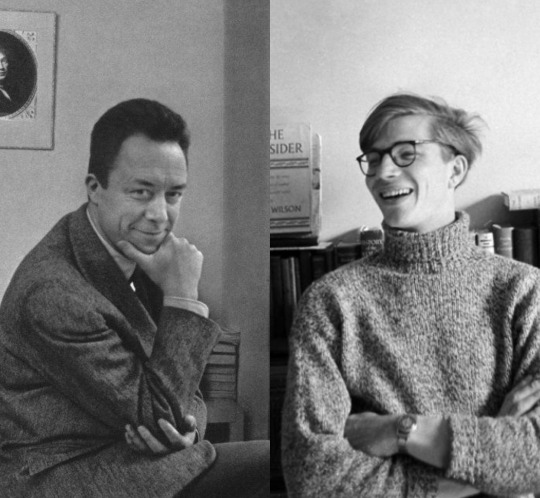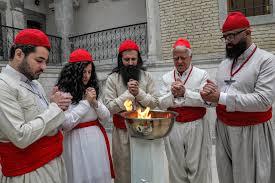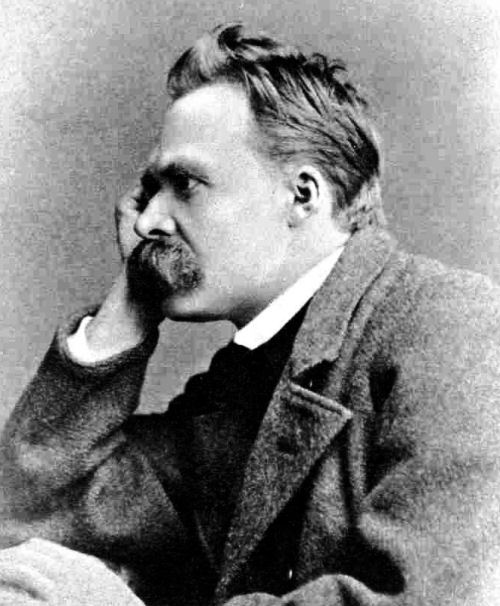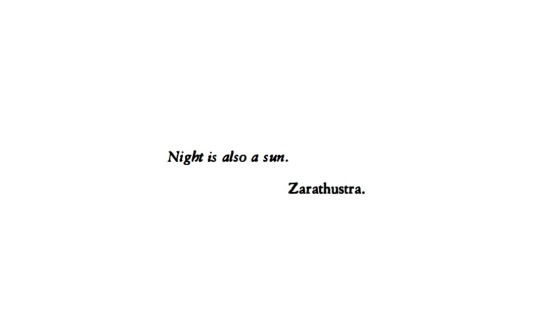#zarathustra
Explore tagged Tumblr posts
Text

Pedro Friedeberg — The Silence of Zarathustra (ink and acrylic on museum board, 2014)
541 notes
·
View notes
Text

“In Sisyphus, we can suddenly see Camus' basic mistake. Life, he explains, is "absurd"—meaningless. You get up in the morning, go to work, spend four hours in the office or factory, eat lunch, work four more hours, go home, eat, sleep, for five days a week— endlessly. And one day you suddenly feel a great weariness and ask: "Why?" One stage further still, and you begin to experience what Sartre calls "nausea," "sensing to what degree a stone is foreign and irreducible to us, with what intensity nature or landscape can negate us. At the heart of all beauty lies something inhuman. . . ." We manage to live with material objects by imposing our feelings on them, until the truth dawns upon us. You see a man in a telephone booth, and again you become aware of the absurd. All of his expressions are part of a dumb show.
This last example really gives the game away. For this kind of absurdity is untrue. Camus' absurdity is not reality seen naked; it is reality deliberately distorted or drained of meaning. To point to a reality drained of meaning, and then to claim that this example proves reality itself is meaningless, is a strange kind of logic. Camus' vision of the world is the vision of a young romantic, heavily tinged with self-pity and a sense of personal inadequacy. Nietzsche began his career in much the same way, by swallowing Schopenhauer in one monstrous gulp, and then groaning with indigestion for two or three years. But Nietzsche outgrew his juvenile pessimism, and created Zarathustra. Camus found the process of transition slower and more painful, because he insisted on clinging to the fallacy that "absurdity" (or "nausea") is a vision of the fundamental truth—life seen without illusions. His failure to see through the fallacy is typical of the lack of logic that characterizes French philosophy in general.” - Colin Wilson, ‘“Lucky” Camus’ (August 1979)
#colin wilson#camus#albert camus#sartre#jean paul sartre#nietzsche#schopenhauer#existentialism#absurdism#nihilism#philosophy#france#french#zarathustra#sysiphus
39 notes
·
View notes
Text



Will be regularly sharing the finished comic, I did all 25 panels in around ~18ish hours so quality may vary! If you find anything confusing MY ASKBOX IS OPEN PLEASE I WILL TALK ABOUT PHILOSOPHY FOREVER- ahem
next panel
#thus spoke zarathustra#lyric arts#digital art#also sprach zarathustra#art#artists on tumblr#24hrcomic2025#zarathustra#friedrich nietzsche#zarathustra comic#philosophy#dark academia
12 notes
·
View notes
Text
idk if someone's done this post already (it seems so obvious!) but can we talk about how closely taylor's character arc mirrors the three metamorphoses proposed by the titular character in nietzsche's thus spoke zarathustra. (i'll use the kaufmann translation.)
"Of three metamorphoses of the spirit I tell you: how the spirit becomes a camel; and the camel, a lion; and the lion, finally, a child."
taylor is first the camel, a beast of burden; in other words, she is skitter. she "makes friends with the deaf," the undersiders, who don't understand what she really wants. she compromises her virtues (do-gooding) in the name of what zarathustra might call "wretched contentment."
then, beginning with the discovery of dinah, taylor begins a terrible and arduous trek into a spiritual desert, where the second metamorphosis occurs, and taylor becomes a lion. "for ultimate victory [s]he wants to fight with the great dragon" -- literally! for zarathustra, the dragon represents all preexisting virtues, the notions of good and evil that have been developed for millenia. dragon, the ai, represents this very moral rigidity -- and by defeating her taylor completes her transformation into proud unyielding weaver, who will brook no opposition to her, uh, ethically unorthodox methodology. only this blond beast could kill aster.
finally, taylor must become the child to complete her task. "why must the preying lion still become a child? the child is innocence and forgetting, a new beginning, a game, a self-propelled wheel, a first movement, a sacred 'yes.' " she must learn to speak a googoogaga-ass language. (as nietzsche notes in the fifth book of the gay science, what is conventional language but a means of becoming part of the herd.) khepri creates her own values, propels the rest of humanity forward. khepri exists, truly, beyond good and evil. "the spirit now wills [her] own will, and [she] who had been lost to the world now conquers [her] own world." khepri was an arrow of longing who crashed mangled and defeated back to the earth.
thus, taylor fully emblematizes an ontology of becoming. she is a bridge to the overman, and zarathustra will bury her with his own hands.
246 notes
·
View notes
Text
Finally...


My historical and religious aesthetics 🔥💫:
A/n: you can make and add your own aesthetic by rebbloging this so I can see yours too =) good luck ✨️
#kingdom of heaven#fandom#aesthetic#artists on tumblr#ancient history#ancient persia#ancient#zoroastrianism#zoroaster#zarathustra#avesta#books#challenge#baldwin iv#koh fandom
50 notes
·
View notes
Text
youtube
Old Time Religion
by Pete Seeger
Give me that old time religion
Give me that old time religion
Give me that old time religion
It's good enough for me.
We will pray with Aphrodite,
We will pray with Aphrodite,
She wears that see-through nightie,
And it's good enough for me.
We will pray with Zarathustra,
We'll pray just like we use ta,
I'm a Zarathustra booster,
And it's good enough for me.
We will pray with those Egyptians,
Build pyramids to put our crypts in,
Cover subways with inscriptions,
And it's good enough for me.
We will pray with those old druids,
They drink fermented fluids,
Waltzing naked though the woo-ids,
And it's good enough for me.
We do dances to bring water,
Prepare animals for slaughter,
Sacrifice our sons and daughters,
And it's good enough for me.
I'll arise at early morning,
When my Lord gives me the warning,
That the solar age is dawning,
And it's good enough for me
Source: LyricFind
Songwriters: Cisco Houston / Woody Guthrie
Old Time Religion lyrics © BMG Rights Management US, LLC
#speaking of zarathustra...#woody guthrie#pete seeger#arlo guthrie#old time religion#zarathustra#zarathustra booster#landscapes#Youtube
5 notes
·
View notes
Text

Friedrich Nietzsche announces the title of his new book (Thus Spoke Zarathustra) in a letter to Heinrich Köselitz.
40 notes
·
View notes
Text
One of the world's oldest and most persecuted religions is making a comeback

If you live in "the West," you might not have heard much about the Zoroastrian religion, outside of that memorable monologue in the first "Austin Powers" movie. But as priceless as that speech is, the Zoroastrian religion deserves to be known for more than just shaving Dr. Evil's balls. Actually, if you follow any Abrahamic faith, your religion owes its existence in part to Zoroastrianism.
Originating in Iran, Zoroastrianism is one of the world's oldest monotheistic religions. It's founder Zarathustra, AKA Zoroaster, lived some time between 1,500-1,000 BCE. He was one of the first in his part of the world to preach the idea of a single, non-corporal deity, as well as the idea of an eternal battle between good and evil. Fire factors into many Zoroastrian rituals, but they don't literally worship it, which is a common misconception.

In Hebrew school, my teachers taught us that ours was the first monotheistic religion. In my Hebrew teachers' defense, it was the 90s, and information was nowhere near as easy to come by as it is now; plus, half of them were in still high school themselves (our synagogue was tiny). In any case, Judaism took inspiration from Zoroastrianism. Zoroastrianism is to Judaism as "Dune" is to "Star Wars." And by extention, Christianity, Islam, Baha'ism, and the Druze religion have a bit of Zoroastrianism in them.
Zoroastrianism uh, declined after Islam became the main religion of Iran. Some Zoroastrians chose to remain in their homeland despite persecution. Others emigrated, and moved throughout the Middle East and South Asia before finally finding refuge in India. This group is now known as the Parsi people.
Freddie Mercury of Queen was a Zoroastrian Parsi.

Zoroastrianism has remained a small religion in numbers, not only due to the persecution, but also because like Judaism, Zoroastrianism has red tape for converts, which it doesn't seek out, and sometimes the kids of mixed marriages aren't counted as members of the faith. (Link)
However, Zoroastrianism is now making a comeback in Iran. The Islamic Republic of Iran has backfired, causing many Iranians to secretly leave Islam for other faiths. Since apostasy is punishable by death in Iran, the exact numbers of those who do so are hard to pinpoint, since they won't exactly broadcast it. Zoroastrianism, Baha'ism and Christianity are all popular choices, while many others are simply Atheist or Agnostic.
Zoroastrianism growing particularly among Kurds rediscovering their roots, and who particularly tend to feel disillusioned with Islam, what with the oppression and genocide and all that.
Many Iranian Muslims have a positive view of Zoroastrianism, recognizing its influence on their culture. Some more fundamentalist individuals on the other hand deny the identity and authenticity of this indigenous faith (And if you're Jewish, you're now saying to yourself, "Woa, deja vu!") But there are also many Muslim leaders who defend Zoroastrians, and call for peaceful coexistence.
And peaceful coexistence should always be the goal.
#zoroastrian#zoroastrianism#zoroaster#Zarathustra#Kurd#iran#persia#minority religions#india#parsi people#parsi#freddie mercury#queen#classic rock#middle east#judaism#christianity#muslim#islam#hindu#baha'i#sharia law#religion#religious connections#decolonization#kurdistan#indigenous peoples#good news#positivity
19 notes
·
View notes
Text
Resistance- that is the distinction of the slave. Let your distinction be obedience. Let your commanding itself be obeying! To the good warrior soundeth “thou shalt” pleasanter than “I will.” And all that is dear unto you, ye shall first have it commanded unto you. Let your love to life be love to your highest hope; and let your highest hope be the highest thought of life! Your highest thought, however, ye shall have it commanded unto you by me- and it is this: man is something that is to be surpassed.
Friedrich Wilhelm Nietzsche, ‘Thus Spoke Zarathustra
9 notes
·
View notes
Text








#zoroastrianism#zoroastrian#zarathustra#parsi#iranian#persian#WE DONT WANT YOU. WERE STILL ALIVE AND WE'RE NOT HERE TO BE STUDIED AND MYTHOLOGIZED
13 notes
·
View notes
Text

Working on the 24h comic channel, follow us or join the challenge LIVE right now on TWITCH
#thus spoke zarathustra#lyric arts#digital art#artists on tumblr#friedrich nietzsche#zarathustra#also sprach zarathustra#art#philosophy#24hrcomic2025
2 notes
·
View notes
Text
My Journey to Zoroastrianism, Part I:
Hello followers! My aim with this blog is to introduce Zoroastrianism to all those who are interested with a unique twist- my own journey, step by step, into the faith of my ancestors in the context of a post-COVID modernity. In this blog I share my insights, translate events into a Zoroastrian framework, discuss the faith and philosophy of Zoroastrianism, and my own personal journey and struggles in adopting this faith and allowing me to understand the world around me. It is my hope that followers can find themselves in my experiences and hopefully derive some benefit from learning about the world through the Mazdayasna lens.
In a world largely dominated by Abrahamic traditions, Greco-Roman philosophy, existentialism and continental philosophy, and of course secular ideologies like liberalism and Marxism, it can be difficult to view phenomena outside of these lenses. For many, the realities of modernity had led to a loss of meaning and purpose, and an unfulfilling life. In helping you all understand the Mazdaean philosophy, it is my hope to help people find this meaning and order. It is not meant for everyone, but for those who find this journey worthwhile, I offer my respect and share my joy. And while many see no validity to the metaphysical and spiritual in the age of machines and code, there is still something to be learned from Zoroastrian as a way of life and a philosophy- even if one does not want to believe in the cosmological. For me, I found this most helpful.
My journey to Zoroastrianism has imbued my life with a sense of purpose and an ethical basis by which to understand the problems of humankind and today's confusion as well as my own inner struggles. As they say in the Zoroastrian tradition, the cosmic battle between Asha and Druj occur not only in the world of Getig, our material reality- they also occur in our inner psyche. The cosmic battle between order and chaos, truth and the lie, righteousness and evil, is just ass much in our hearts and minds as it is all around us. And we are tasked to make meaning of this and partake on both fronts. Throughout this journey I will refer to Zoroastrian phenomena and concepts in both symbolic form, tying them to real-world phenomena, and in lore-form, respecting the faith as-is.
A turning point in my life was in the years of 2020-2024. Much happened here that made me reach a limit of sorts. The best way I can describe it is that my soul and mind were worn out. I was raised a Christian, but had a falling out with the faith in my late teens and into my twenties. I became an atheist in the era of the New Atheist movement, voraciously reading Dawkins, Hitchens and Sam Harris. I found that divorcing myself of my juvenile understanding of God and the Cosmos was liberating, and though surrendering to an unknown void was terrifying at the time, I slowly felt less of a need for faith, belief in an afterlife, or deity in my life. I still, during that time, was not acutely acquainted with mortality, and I was surrounded by negative influences that imbued me with a sense of despair and pessimism. I saw that without this guiding light, I could continue to live on an ethical basis of humanism, but as I got to know humans more- our psyches, our systems, our motivations, and the true nature of history- I realized humanity as a species is deeply flawed and in many ways not redeemable. I found myself seeing the point in Christianity's concept of sin and repentance. My foundation of humanism was challenged when I learned to challenge my inner narratives that I was a good person, I learned that much evil occurs when people believe they are right and others are wrong. I realized our minds lie to us, they protect us with defense mechanisms designed to justify our selfish interests while convincing us we are inherently good and those that are antithetical to us are wrong.
I believed in naive notions of progress, fostered by Enlightenment thinking. Deep down I believed in progress not just historically, but personally. I believed as long as I kept trying to perfect myself, rid myself of trauma and flaws, process emotions and develop a sense of worldly maturity, that the world will accept me, that I'll finally fit in. I had this wrong-headed belief in experts and authorities, believing that the world was just, had an order and expectation to it, a rhythm of propriety, and if I just brought myself up to par, the world would be easier. I was dead wrong in this as events of the past several years taught me our world is anything but just and ordered in its current form, that experts are often pushing angles and just as imperfect as we are, that the true nature of the human application of justice and law is deeply biased and imperfectible, and that blind belief in progress makes us unthinking followers. I also saw society going in many directions that I felt were puzzling, and ultimately saw that society as a whole had no answer to global injustice, and that we are all partaking in it. This stirred something in me. I could no longer use humanism as an ethical basis to live my life. It placed too much faith and hope in our imperfect species and world, and it masked raw self-interest, political motivations and prejudices. I realized then that what I needed was to find something rooted in an ideal we ought to aspire to.
2 notes
·
View notes
Text
Ultimately our morality is not an invention, but an instinct.
— Carl Jung, Zarathustra Seminar
47 notes
·
View notes
Text
“ What land should I flee to?
Where should I go to flee?
From my family and from my clan
They banish me.
The community to which
I belong has not satisfied me
Nor have [the rulers] of the country.
How, Thee, can I satisfy, O Mazda Ahura? ” (Yasna 46.1)
Zarathustra, prophet of Zoroastrianism, after his vision that monotheism must be the only true god, debated all those among the priestly class and won in each case, but the king still wanted to throw him in prison. Around this time, he wrote these lines. Only some time later, after a private audience with the King, did the King come to understand his ideas, seeing that the priestly classes main concern was a threat to their power, and he changed his mind, granting him his life.
#zoro#zoroaster#zarathustra#persian#iran#persia#history#religion#religious history#archeology#ancient history#ancient religion#zoroastrianism#religious studies#monotheism#spirituality#quotes#literature#interesting#facts
25 notes
·
View notes
Text

The story of every atheism is the same.
The Ugliest Man, the murderer of God, subjects himself to Zarathustra, because Zarathustra has recognized him, and looked into his depth with divine understanding. The murderer of God finds God in man. He has not succeeded in killing God at all. God has returned in Zarathustra, and in the new period of history which Zarathustra announces. God is always revived in something or somebody; He cannot be murdered. The story of every atheism is the same. ~ Paul Tillich
2 notes
·
View notes
